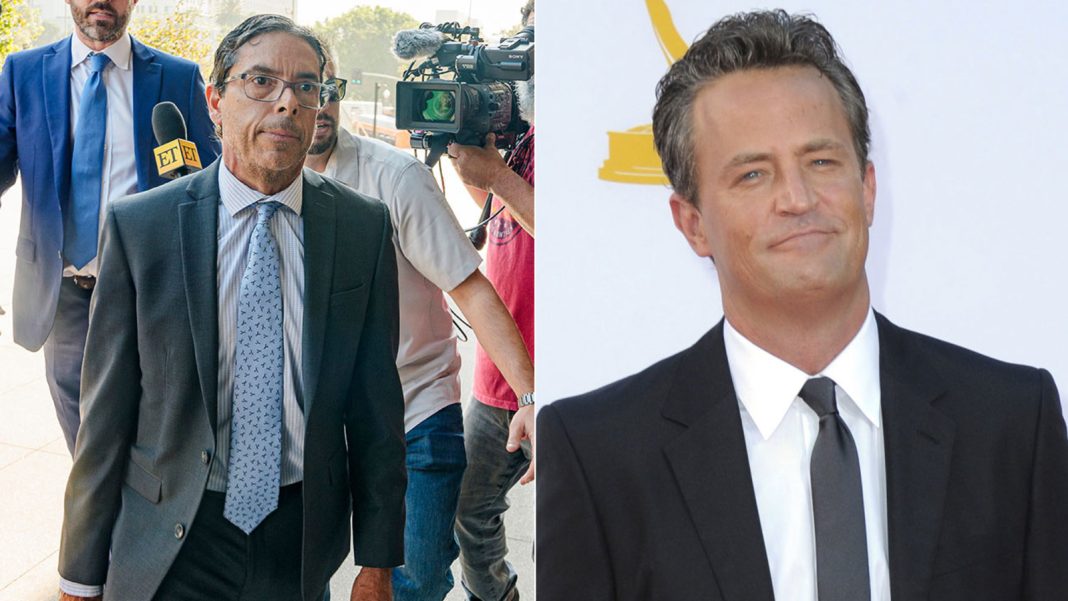In a tragic turn of events, the death of beloved actor Matthew Perry has prompted serious legal repercussions for those involved in his life and struggles with substance abuse. Perry, best known for his role in the iconic television series “Friends,” was discovered unresponsive in his jacuzzi on October 28, 2023, at the age of 54. An autopsy confirmed that his death resulted from acute ketamine toxicity, a revelation that has since unraveled a disturbing narrative involving medical professionals and illicit drug distribution.
Mark Chavez, one of the doctors charged in connection with Perry’s death, recently pleaded guilty to conspiracy to distribute ketamine that resulted in death and serious bodily injury. Appearing in federal court in Los Angeles, Chavez admitted to his actions, acknowledging that he distributed ketamine for monetary gain. His attorney, Matthew Binninger, emphasized that Chavez has accepted responsibility for his role in this tragic incident, stating, “He’s taken this incredibly seriously.” As part of his plea agreement, Chavez has agreed to surrender his medical license, a significant step that highlights the gravity of the situation.
The legal repercussions extend beyond Chavez. He is one of five individuals facing federal charges linked to Perry’s death, including Dr. Salvador Plasencia, who is accused of being a key player in the illicit distribution network. Plasencia, along with Jasveen Sangha, dubbed “The Ketamine Queen,” allegedly sold Perry the very batch of ketamine that led to his fatal overdose. Both have pleaded not guilty, indicating a potentially drawn-out legal battle ahead.
According to the Department of Justice, the conspiracy to illegally supply Perry with ketamine involved a series of transactions that painted a chilling picture of exploitation. Chavez and Plasencia were reportedly in communication as recently as September 30, 2023, discussing the acquisition of ketamine for Perry, who was known to struggle with a ketamine addiction. Chavez’s arrangements included the transfer of at least 22 vials of liquid ketamine and nine lozenges, all understood to be for Perry’s use. This alarming network, which operated under the guise of providing medical care, raises critical questions about the ethics of medical professionals and the systems in place to prevent such abuses.
With sentencing scheduled for April 2, 2025, Chavez faces a potential prison term of up to 10 years. However, the implications of this case extend far beyond individual accountability. Experts argue that prosecuting high-profile drug-related deaths serves a dual purpose: it not only seeks justice for the victims but also sends a strong message about the responsibilities of medical professionals and the dangers of addiction.
The fallout from Perry’s death has reignited discussions about the medical community’s role in the opioid crisis and substance abuse treatment. As noted by addiction specialists, the line between providing necessary treatment and facilitating addiction can often blur, particularly in cases involving celebrities who have the means to pay for expensive and potentially dangerous substances. The tragic circumstances surrounding Perry’s passing serve as a stark reminder of the urgent need for reform in the way addiction is treated and monitored within the healthcare system.
As this case unfolds, it will undoubtedly shine a spotlight on the broader issues of drug distribution, addiction treatment, and the ethical responsibilities of healthcare providers. The hope is that through accountability and reform, the tragic loss of Matthew Perry will lead to meaningful changes that protect others from similar fates. In the meantime, the legal proceedings against those involved will continue to develop, revealing more about the dark underbelly of celebrity culture and the exploitation that can occur within it.


